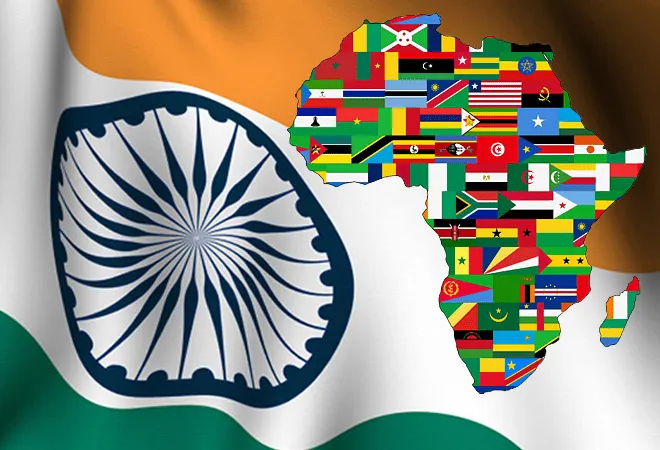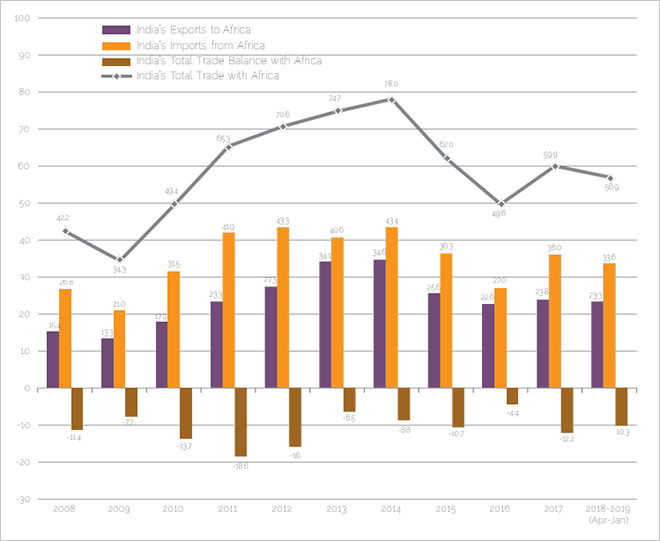-
CENTRES
Progammes & Centres
Location

Various historical, cultural, and economic linkages underpin the Africa- India relationship. In the last few decades, and more specifically from 2014 onwards under the Narendra Modi-led BJP government, India is increasingly investing in its relationship with Africa. This is both for political reasons and as an expansion of its economic stake in the continent. After Prime Minister Modi’s declaration that his government will accord ‘top priority’ status to Africa in the country’s foreign and economic policy, India’s long-standing ties with the continent have acquired vibrancy and dynamism, marked by an unprecedented intensification of political engagement.
India has an intrinsic stakeholder interest in helping Africa realise its true potential. The spirit of ‘developing together as equals’ defines their bilateral partnership. When it comes to addressing challenges in specific areas, this partnership can stimulate South-South Cooperation. There is a renewed focus on development cooperation, lines of credit, and capacity building in human resource and technology. At the same time, the Indian private sector is poised to play an increasingly important role by participating in projects of national development and regional connectivity in Africa. Investment is also increasing in diverse sectors including pharmaceuticals, telecommunications, energy, power and automobiles, IT services, computer sciences, and hydrocarbon, among others.
Undoubtedly, there has been a quantum increase in Africa’s centrality in Indian foreign policy initiatives. However, for the longest time, India was unable to leverage its century-old trade partnership and socio-cultural linkages built on a thriving diaspora. Given India’s current re-engagement with Africa, there needs to be a clear mapping of the pull factors that define India’s current re-engagement with African countries, along with measures for realising the true potential of the India-Africa partnership.
The challenges facing India and African countries are similar. Both possess emerging economies with a demographic dividend and youth bulge. Just as India and Africa fought colonialism, both continue to work together for a just, representative, and democratic global order that has a voice and role for one-third of humanity that reside in both regions.<1> The present realities of the world cannot keep Indian and African voices out of the decision-making process.
The new thrust and vigour in the India-Africa partnership found its most concrete expression during PM Modi’s address at the Parliament of Uganda during his state visit there in July 2018. In his speech, he outlined a vision for not just a bilateral partnership with Africa but also a partnership at the multilateral level by espousing 10 Guiding Principles for India-Africa engagement.<2> Each of these principles is a reflection of India and Africa’s emerging partnership, as both stand on the threshold of a future of great promise.
From 2014 onwards, there have been a total of 29 visits to African countries from the Indian side at the level of President, Vice President, and Prime Minister, apart from several ministerial level visits. From the African side, more than 32 Heads of State or Government have visited India in the last four years. Even in the International Solar Alliance (ISA), out of the 48 countries that have signed and ratified the ISA Framework Agreement, 25 countries are from the African continent.<3> Given the success of these high-level visits, the Indian government has approved the opening of 18 new Indian Missions in Africa over a period of four years from 2018-2021.<4> This will increase the number of Resident Indian Missions in Africa from 29 to 47. The first of these resident missions opened in Rwanda in July 2018.
India is currently Africa’s fourth-largest trading partner, and Africa’s third-largest export destination. Indian government initiatives like Focus Africa (2002), TEAM-9 (2004), Duty-Free Tariff Preference Scheme for Least Developed Countries (2008), and the institution of the India Africa Forum Summit (held in 2008, 2011, 2015), have succeeded in lifting bilateral trade and investment flows to new heights. On the trade front, bilateral trade volumes between India and Africa have grown from a mere US$7.2 billion in
2001 to peak at US$78 billion in 2014, before falling to US$59.9 billion in 2017. For the year 2017–18, India’s bilateral trade with Africa stood at US$62.66 billion,<5> reflecting an increase of nearly 22 percent over the previous year (See Figure 14).
Figure 14: Trends in India–Africa Trade (in US$ billion)
 Source: Author’s calculation based on Department of Commerce, Export Import Data Bank.
Source: Author’s calculation based on Department of Commerce, Export Import Data Bank.Despite recent growth, India has a negative trade balance with African countries mainly due to its over-dependence on and high demand for oil and natural resources. To correct this imbalance, India needs to expand and diversify its exports to include both primary and manufactured goods. Negative trade balance notwithstanding, there has been a surge in Indian investments in Africa, owing to high-growth in some African markets and their mineral rich reserves. India is currently the fifth-largest investor in Africa with cumulative investments of US$54 billion.<6>
Under PM Modi’s leadership, India’s engagement with the Indian diaspora in African countries has acquired new salience, enabling a shift from the policy of ‘active-disassociation’ in previous decades, to ‘proactive association’ in recent years. PM Modi’s charisma, oratory skills, and personal bonds with African leaders have attracted large crowds during his visits, and infused enthusiasm within the Indian community living in various African countries. However, it is vital for the Indian government to move beyond rhetoric. There should be a push towards enhancing people-to-people contacts and sensitising Indian communities about the diversity, culture, and ways of life of Africans. The nation must refrain from blindly following Western media’s reportage on and portrayals of Africa. An increase in media contacts is essential for Indians to gain a clear picture of the diversity of the continent. To further increase people-to-people contacts and boost tourism, the number of direct non-stop flights connecting Indian cities like New Delhi and Mumbai to African cities must be increased. Airlines such as Air India are already working on expanding their operations in cities like Nairobi, Dodoma, Dar es Salaam, Maputo, Mahe, Port Louis, Djibouti City, Antananarivo, and Mogadishu.<7>
In spite of increased engagement, incidents of racism and intolerance against African students who come to study in India are hindering India- Africa relations. India must take strict action against the perpetrators of such acts and establish effective institutional mechanisms to redress the grievances of foreign nationals and ensure their safety. Arranging frequent meetings with Residents Welfare Associations and working on community awareness programmes would be a step in the right direction.
Today, Africa is a continent of limitless possibility, with increasing trade, investments, and a surge in innovation. India’s re-engagement with Africa is taking place in a fast-changing and dynamic environment. African governments and leaders are playing an effective role in shaping the continent’s future and the region is witnessing rapid growth. At a time when various non-western powers like Japan, China, Malaysia, and Singapore are stepping up their presence in Africa, it is imperative for India to regularly consult with its African partners, and leverage its unique blend of development packages, technology transfer, human resource development, and infrastructure development, in order to be truly recognised as an ‘alternative development partner’.
This article originally appeared in special report Looking Back looking Ahead.
<1> “Prime Minister’s Address at Parliament of Uganda During His State Visit to Uganda”, Ministry of External Affairs, Government of India, 25 July 2018.
<2> Ibid.
<3> “ISA Prospective Member Countries”, International Solar Alliance.
<4> “Cabinet Approves Opening of Missions in Africa to Implement Commitments of India-Africa Forum Summit (IAFS-III)”, Press Information Bureau, Government of India, 21 March 2018.
<5> “Remarks by External Affairs Minister at the Africa Day Celebrations at Vibrant Gujarat 2019", Ministry of External Affairs, Government of India, 19 January 2019.
<6> Ibid.
<7> Low levels of direct air connectivity between India and African countries is a major issue, which is why Air India is looking to start direct air services from Indian cities such as Mumbai and New Delhi, to African countries especially on the east coast.
The views expressed above belong to the author(s). ORF research and analyses now available on Telegram! Click here to access our curated content — blogs, longforms and interviews.

Abhishek Mishra is an Associate Fellow with the Manohar Parrikar Institute for Defence Studies and Analysis (MP-IDSA). His research focuses on India and China’s engagement ...
Read More +